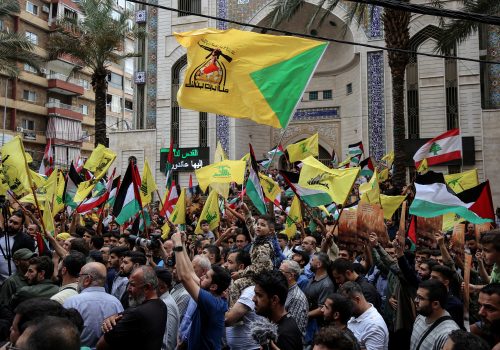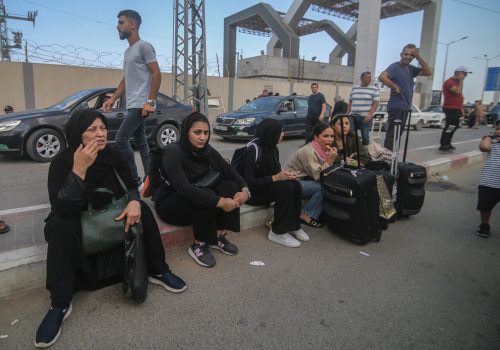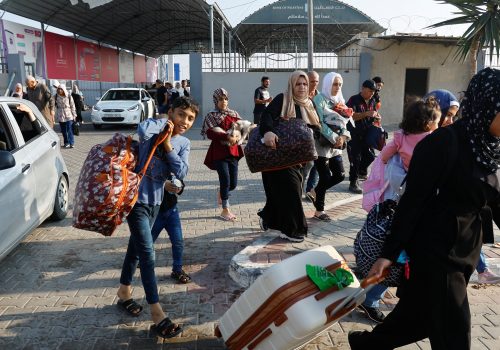The mouth of Hezbollah chief Hassan Nasrallah hath spoken—and nothing useful came out
The much-anticipated speech of Hezbollah’s talkative Secretary-General Hassan Nasrallah came and went on November 3. For all the hype drummed up by Hezbollah’s propaganda organs in the lead up to Nasrallah’s first address since the onset of the Gaza-Israel war on October 7, the speech turned out to be much ado about nothing; it was filled with the terror chieftain’s worn clichés, predictable threats, and tired rhetoric.
Careful observers of Hezbollah—particularly the terrorist group’s behavior since the onset of Lebanon’s economic collapse—will note that much of the content was entirely predictable. However, that predictability reveals much about Hezbollah’s current state and its constraints. It allows us—to the degree possible without powers of clairvoyance—to anticipate the group’s moves as the conflict between Israel and the coterie of Gaza-based terror organizations (operating as the Joint Operations Room of the Palestinian Resistance Factions) unfolds.
Nasrallah’s speech lasted one hour and twenty minutes—equally typical in format and content. He framed the Al-Aqsa Flood operation as defensive and claimed that the brutal rampage against southern Israel’s residents was a natural consequence of Israeli policies, such as the continued detention of entirely innocent Palestinian prisoners—or one would think, listening to Nasrallah—in Israeli jails; recent threats against Al-Aqsa Mosque that were “unprecedented since Jerusalem was occupied in 1967”; the Israeli blockade on Gaza nearing its twentieth anniversary; and the current Israeli government’s vociferous expansion of settlements in the West Bank.
“Palestine,” he said, had been abandoned by the world until the “heroic, great, and grand operation” [referring to the October 7 attack] restored it to its rightful and central place. Even the brutal murder of Israeli children in the Hamas-led onslaught did not deter the secretary-general from heaping effusive praise upon the attack. To dismiss any of his followers’ possible qualms about the morality of of the October 7 attack, he claimed that “So-called Israeli civilians” weren’t killed by the “brave, great, and genius” rampaging terrorists but by “the Israeli army… acting in fury, insanity, and confusion,” thereby simultaneously reemphasizing Hezbollah’s claims of Palestinian sinlessness and Israeli bloodlust.
Having absolved the Palestinian side of moral culpability, Nasrallah lauded Al-Aqsa Flood’s accomplishments. Here, too, there was little new in the way of his rhetoric. According to Nasrallah, Israel is a brutal and murderous entity whose behavior in Gaza “confirms everything we know about it,” and whose nature had once again been revealed to all Arabs and Muslims, including those who had normalized relations with Jerusalem.
Nevertheless, Nasrallah stressed that Israel is also weaker than a spider’s web, which even the Israelis know, and that it would be unable to survive without US military assistance, which was delivered in haste. That assistance, he claimed, also demonstrated ultimate and “complete” American responsibility for the ongoing war, where Israel was the mere executing tool. Meanwhile, he alleged that all of Israel’s retaliatory “brutality” and American assistance could not rewind the countdown to the Jewish state’s demise that began on October 7. He further asserted that this proved that Israel had not learned the lessons of its previous wars with Hezbollah and the Gazan militant factions.
Unsurprisingly, Nasrallah also claimed that Operation Al Aqsa Flood’s planning and execution were entirely the decision of the Palestinian factions from start to finish and had surprised even Hezbollah. This was his usual attempt to both stress the military prowess of the relevant Resistance Axis faction and absolve Iran of any consequences.
Nasrallah’s announcement of Hezbollah’s next steps was the most anticipated part of his speech. Since the group had hyped up the speech leading up to the moment of its delivery, it was doubtful that Nasrallah would declare war on Israel. His group and their Resistance Axis allies prefer to deliver surprise blows to their adversaries. Acting perfidiously allows the Resistance Axis factions to maximize the harm they can deal to their foes, with the October 7 attack being a prime example. Nasrallah stressed this in his speech, lauding Al-Aqsa Flood’s timing for catching the Israelis “lost, dazed, and confused” on “the Sabbath and a holiday.”
Rather than announce an escalation, Nasrallah declared that Hezbollah had already entered the conflict on October 8, with its low-level—albeit intensifying—harassment of Israel constituting the group’s contribution to the war. While Nasrallah left the possibility of escalation open, saying “all options are on the table”—a threat giving the impression that Hezbollah has the upper hand in the fight against Israel, but vague enough to give leeway for the group to content itself with attacks short of full-blown war.
The underwhelming nature of Nasrallah’s speech reflects that Hezbollah, despite its bellicose rhetoric, is unprepared for war. The group remains constrained by the effects of Lebanon’s economic collapse. It worries that inviting a foreign war upon the country—particularly when post-war reconstruction aid is unlikely to be forthcoming from Beirut’s traditional donors—could likely turn the Lebanese street against Hezbollah and many of the group’s own supporters.
To avoid appearing weak against Israel to its supporters—raising questions about its utility—Hezbollah is falling back on a pattern of using propaganda to cover its inaction against the Jewish state, particularly during—per Nasrallah’s admission—such a critical juncture for the Resistance Axis. As a result, Hezbollah can be expected to continue the low-level attacks that it and Lebanon-based franchises of Palestinian militias have been conducting against Israel. This would allow Hezbollah to appear powerful without escalating to a full war.
Nasrallah correctly claimed these attacks were impacting Israel’s war effort, but exaggerated their importance and Hezbollah’s contribution. He said Hezbollah was preventing the Israel Defense Forces (IDF) from devoting its full attention to the war in the Gaza Strip and also stressed that Hezbollah’s attacks had forced thousands of Israeli citizens to flee the country’s north, adding pressure on Israel’s economy and morale. This, he said, was “an accomplishment,” noting that “anyone looking at what is happening along the border objectively will find it very big, important, and impactful.” It was then that Nasrallah dangled the possibility of escalation.
Realistically, however, the group will likely only increase the frequency and destructiveness of its attacks in response to Israeli ground troops becoming more committed in the Gaza Strip. But, even then, Hezbollah will refrain from opening a full conflict from the Lebanese front. As the grueling nature of urban combat takes its toll on IDF troops, reserve mobilization impacts the Israeli economy, and the Palestinian death toll—and harrowing images from Gaza—erodes international support for Israel’s war effort, Hezbollah may feel more leeway to conduct attacks it might normally avoid against Israel. Nasrallah even noted that Israel was now tolerating attacks from Lebanon that it would not have in the past for “fear” of opening a second front.
This suggests that Hezbollah’s strategy for the duration of the war—undoubtedly adopted at Iran’s behest—may be to keep Israeli forces divided along two fronts, taxing the country’s economic, human, and military resources and slowing the IDF’s advance in Gaza. This, Hezbollah hopes, would allow time for a ceasefire to be imposed prematurely by the international community, enabling the Joint Operations Room of the Palestinian “resistance” factions to survive, rebuild, and fight another day.
Such an outcome would turn Israel’s current war in Gaza into another inconclusive conflict against the Resistance Axis, leaving behind a remnant of those groups that would have the time to grow again and pose a greater threat to the Jewish state. That explains why Nasrallah stressed that “no effort should be spared to stop the aggression on Gaza,” calling on “every free and honorable person” to engage “in the battle for public opinion” to turn international sentiment against Israel’s war effort and impose a ceasefire.
The strategy of ensuring that Gaza-based terrorist groups survive this war and fight on echoes a threat issued by Hamas Politburo member Ghazi Hamad: the group will repeat the October 7 attack repeatedly until Israel is finally destroyed because its mere existence “constitutes… a catastrophe to the Arab and Islamic nation.” This dovetailed with Nasrallah’s emphasis, two days later, that the Resistance Axis had yet to reach the point of “victory by fatal blow” against Israel. For that, he said, “We still need time… but we are winning in increments… our battle is one of resilience and patience.”
While this may indeed be Hezbollah’s objective, the question remains open regarding Israeli patience. When Hezbollah launched the July 12, 2006 attack that spiraled into the Second Lebanon War, Israel was engaged in Operation Summer Rains, which was aimed at suppressing rocket fire from the Gaza Strip into the Western Negev. But Hezbollah’s attack from the north was grievous enough to redirect Israeli ire and attention to Lebanon, prompting Nasrallah’s now-infamous admission that he would not have approved his group’s attack on July 12 if he had known that it would lead to a war of the magnitude of the Second Lebanon War.
Admittedly, Israel’s incursion into Gaza is much deeper today than it was in 2006. But the stakes for the Jewish state are much higher as well, and Nasrallah may once again be confronted with a situation where his group and Lebanon suffer the unintended consequences of Hezbollah’s continued brinksmanship across the Blue Line.
David Daoud is a senior fellow on Hezbollah at the Foundation for Defense of Democracies (FDD).
Further reading
Wed, Oct 11, 2023
Hamas’s attack on Israel was straight out of Hezbollah’s playbook
MENASource By David Daoud
The genesis of Operation Al-Aqsa Flood appears to originate with Hezbollah, at least in part. The pressing question now is what will Hezbollah do next?
Sat, Oct 14, 2023
Egypt cornered over Israel’s war on Hamas
MENASource By Shahira Amin
Whether Egyptian President Abdel Fattah el-Sisi will bow under US and Israeli pressure remains to be seen.
Fri, Nov 3, 2023
As the Gaza war continues, Egypt is facing pressure to act
MENASource By Shahira Amin
As Israel expands its ground raids in the Gaza Strip, Egypt is witnessing the ripple effects of the war and faces growing pressure to act in regard to Palestinian refugees.
Image: Iranian men at a square in Tehran as Lebanon's Hezbollah Secretary-General Hassan Nasrallah gives a speech, November 3, 2023. Hassan Nasrallah spoke in Beirut about the Israeli army's attack on Gaza and warned Israel about a possible attack on Lebanon. (Photo by Morteza Nikoubazl/NurPhoto)


